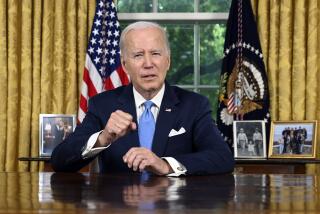Emergency Steps Taken to Avoid Federal Debt Ceiling
- Share via
WASHINGTON — Treasury Secretary John W. Snow said Thursday he had begun using emergency accounting maneuvers to avoid breaching the federal debt ceiling, and called on Congress to act soon to avert a fiscal crisis.
Snow sent a letter to congressional leaders saying he had stopped purchasing Treasury securities for a government employee retirement fund to keep the federal debt from exceeding the $7.4-trillion limit established in May of last year. As of Wednesday evening, the government was $4.1 billion below the limit.
Snow said the financial juggling would forestall trouble for several weeks, but he warned lawmakers that they would need to raise the debt ceiling when they returned to Washington on Nov. 16.
“It is imperative that the Congress take action to increase the debt limit by mid-November, at which time all of our previously used prudent and legal actions to avoid breaching the statutory debt limit will be exhausted,” Snow wrote.
At stake, Snow said, was “the full faith and credit of the U.S. government.”
If Congress failed to boost the debt limit, the government eventually would be forced to default on payments to the holders of government bonds. That has never happened, and lawmakers and economists said it seemed inconceivable that it would be allowed to happen now.
Still, the debt squeeze comes at an awkward time for the Bush administration and congressional Republicans. The need to raise the ceiling calls attention to the big deficits accumulated since President Bush took office.
Although Republicans managed to defer a potentially fractious floor debate until after the Nov. 2 election, the emergency procedures announced by Snow provided instant political fodder to administration critics.
“George Bush continues to make history for all the wrong reasons,” said Phil Singer, spokesman for Sen. John F. Kerry, Bush’s Democratic challenger. “His fiscal management is taking a toll on America.”
Kerry campaign officials cited Bush’s 2001 budget, which said the federal debt ceiling would not have to be increased until 2008 if Congress adopted the president’s tax and spending proposals.
Instead, the administration wound up seeking three increases in the statutory limit. Congress boosted the ceiling by $450 billion in 2002 and $984 billion in 2003. House Republicans are proposing a $690-billion increase this time, for a combined total of $2.1 trillion.
“There’s no way to dismiss debt ceiling increases that total $2.1 trillion and keep on rising,” said Rep. John M. Spratt Jr. of South Carolina, the ranking Democrat on the House Budget Committee. “Administration spokesmen call this level of debt manageable, but it’s hard to call a mountain of debt good management.”
Bush campaign officials had no immediate response.
Although the Bush tax cuts were a big cause of the rapid swing from black ink to red, other factors were at work, economists say. The bursting of the stock market bubble, the 2001 recession and the Sept. 11 attacks were also cited as contributing to the debt problem.
Separately, the Treasury Department released its final accounting of the 2004 fiscal year, which ended Sept. 30. It said receipts were $1.9 trillion and spending was $2.3 trillion, leaving the government with a record shortfall of $413 billion.
Although last year’s deficit was the largest ever in dollar terms, as a percentage of the economy it was not. The 2004 deficit was equal to 3.6% of the nation’s gross domestic product, compared with 6% in 1983.
White House officials said the deficit could be tamed.
“If we stick with the president’s plan of economic growth and spending discipline, we will continue to see improvement and we will cut the deficit by more than half in five years,” White House Budget Director Joshua Bolton said in a statement.
The emergency measures announced by Snow have been employed several times. When Clinton administration Treasury Secretary Robert Rubin took similar steps, he was roundly criticized by Republicans.
Snow said the suspension of Treasury security purchases by the Government Securities Investment Fund would have no adverse effects on federal retirement plan participants. He said he would resume purchases as soon as Congress raised the debt limit.
Drew Matus, senior economist for Lehman Brothers in New York, said financial markets would not be rattled by the debt ceiling maneuvers as long as it appeared certain Congress would fix the problem shortly after the election.
“Most likely nothing is going to go wrong. Treasury will be able to get around the debt ceiling, and Congress will come back and pass it when they absolutely have to,” Matus said. “It’s becoming an annual game of chicken played between Congress and the Treasury Department.”
More to Read
Get the L.A. Times Politics newsletter
Deeply reported insights into legislation, politics and policy from Sacramento, Washington and beyond. In your inbox twice per week.
You may occasionally receive promotional content from the Los Angeles Times.










